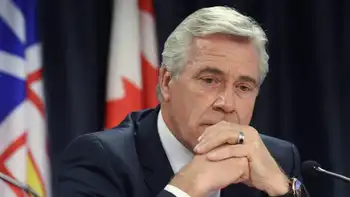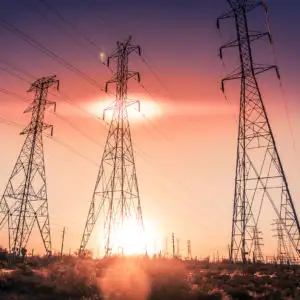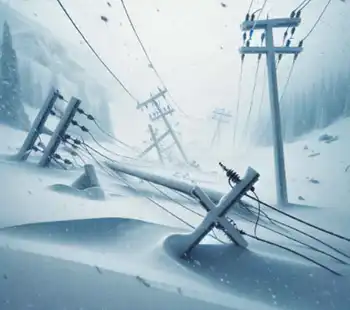Poor Utility Cooperation led to blackout, CEO says
WASHINGTON — - WASHINGTON — A breakdown in communication and co-operation among Midwest utilities contributed significantly to the worst power blackout in North American history, a utility executive has told congressional investigators.
Government and industry officials, testifying at congressional hearings that begin today, will say it's too early to pinpoint the cause of the Aug. 14 blackout that cascaded from Ohio through Michigan and into parts of Ontario, then engulfed New York state.
But the governors of Ohio and Michigan will join the call for Congress to enact new federal electricity grid reliability standards, replacing the voluntary standards that most now agree are inadequate.
In a letter to House of Representatives investigators, the chief executive of a major Michigan utility says he is convinced that a power plant shutdown and transmission line failures in Ohio "were the triggering event for the blackout" and that an "apparent failure in communication" was a major reason the problem spread.
"For some reason, the required level of communications and co-ordination failed on Aug. 14," Anthony Earley Jr., chairman and chief executive officer of DTE Energy, wrote the House Energy and Commerce Committee. He said this "apparent breakdown in communications between the Ohio utilities and other utility systems" must be dealt with.
Earley, whose Detroit Edison serves five million people in southeastern Michigan, complained that "Michigan utilities did not have timely or adequate warnings about deteriorating systems condition in Ohio" during the hour before the blackout.
He said Detroit Edison did not begin to detect anything unusual until 4:06 p.m., five minutes before the blackout hit full force in all or parts of eight states. Investigators said the first of five transmission line failures in Ohio began occurring an hour earlier.
In a separate letter to House investigators, FirstEnergy Corp., the Ohio-based company whose generating plant and transmission line failures have been at the centre of the blackout investigation, dismissed the notion that a single event triggered the blackout.
"The events of the day . . . involved thousands of separate and discrete incidents across a widespread multisystem region," H. Peter Burg, FirstEnergy's chairman and chief executive, wrote the committee.
In a presentation today to financial analysts in New York, First Energy's chief financial officer, Richard Marsh, said, "There is probably no single straw that broke the camel's back. We think what happened is a combination of events, not an isolated event on anybody's line or any one operator."
Executives of the International Transmission Co., which operates transmission lines in Michigan, also have complained that their engineers did not receive even a courtesy call from Ohio utility officials about their line problems prior to the blackout.
When ITC found out about the problems on the Ohio lines, "it was at the point of no return" and too late to act, Michigan Gov. Jennifer Granholm will tell the lawmakers. She says in prepared remarks that had Michigan grid operators been warned, "they might have been able to craft a contingency plan . . . and avoid the cascading failures."
The grid's reliability should not depend on a courtesy call, Ohio Gov. Bob Taft says in his testimony. "Frankly," his text says, ``in the 21st century a system that relies on courtesy calls is clearly outdated and must be modernized."
The hearing today by the House Energy and Commerce Committee will be the first congressional inquiry into the blackout, which has spawned renewed interest in Congress to act to increase the reliability of the country's aging power transmission systems.
"We're very concerned that there are shortcomings in the system. The grid is designed to handle multiple disturbances without going down. But clearly for whatever reason the system failed this time," said Ken Johnson, a committee spokesman.
Energy Secretary Spencer Abraham, co-chairman with Natural Resources Minister Herb Dhaliwal of a U.S.-Canada task force investigating the blackout and the lead-off witness at the hearing, will reiterate his recommendation for Congress to enact mandatory reliability standards to be enforced by the government.
Taft and Granholm will support such standards, as will Pat Wood, chairman of the Federal Energy Regulatory Commission. "Currently there is no direct federal authority or responsibility for the reliability of the transmission grid," Wood says in testimony prepared for the hearing.
"The electrical system in this country must include a system of accountability. We need to know who is responsible for what," says Granholm.
Representative Billy Tauzin (R — La.), the committee's chairman, has said he hopes to have a broad range of electricity proposals as part of a broader energy bill ready for approval by the end of the month.
Some Democrats want to avoid getting the electricity measures entangled with other, controversial energy issues such as whether to drill for oil in the Arctic National Wildlife Refuge.
Representative John Dingell (D — Mich.) said today he will introduce separate legislation this week that would require the electricity industry to comply with mandatory transmission standards. But Tauzin wants to include the new requirements as part of a broader package of electricity provisions to be passed as part of comprehensive energy legislation. Therefore, he and other Republicans will oppose Dingell's bill.
Related News

N.L., Ottawa agree to shield ratepayers from Muskrat Falls cost overruns
ST JOHNS - Ottawa and Newfoundland and Labrador say they will rewrite the financial structure of the Muskrat Falls hydro project to shield ratepayers from paying for the megadam's cost overruns.
Federal Natural Resources Minister Seamus O'Regan and Premier Dwight Ball announced Monday that their two governments would scrap the financial structure agreed upon in past federal-provincial loan agreements, moving to a model that redirects benefits to ratepayers.
Both politicians called the announcement, which was light on dollar figures, a major milestone in easing residents' fears that electricity rates will spike sharply when the over-budget dam comes fully online next year.
"We…




